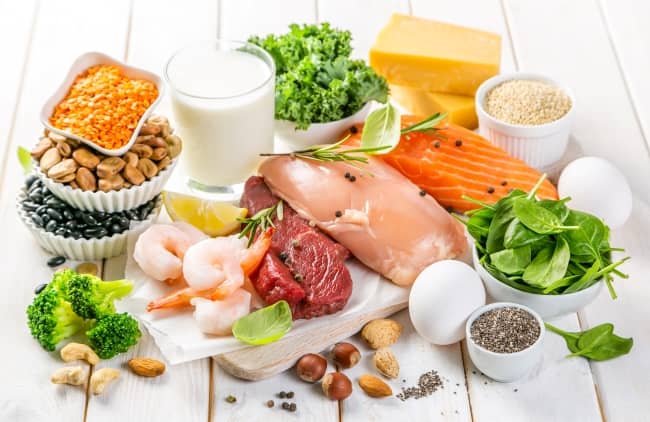Eating for Energy: How to Use Food to Boost Your Productivity and Focus
Food is the main source of energy for the body, meaning “food is fuel” is more than just a phrase.
While food shouldn’t be viewed as ‘bad’ or ‘good’, certain foods can help support higher energy levels, improved focus, and increased productivity.
In this article, we’ll look at the best foods for naturally increasing energy levels and improving focus.
Eating for Energy: The Best Foods to Boost Focus and Productivity
Eat Complex Carbs for Energy
Carbs get a bad rap, but carbohydrates get broken down into glucose, which the body uses for energy. The key to supporting balanced energy levels is paying attention to the type of carbohydrates you consume.
The right carbohydrates can help promote steady energy levels and mental clarity. Simple carbohydrates are quickly broken down, leading to a spike in blood sugar levels and the dreaded crash. Simple carbs are found in white bread, candy, cookies, biscuits, ice cream, chips, and white pasta.
Complex carbs require more energy to break down and get digested slower, helping to stabilise blood sugar levels and provide balanced energy.
Complex carbs can be found in foods such as:
- Butternut squash
- Acorn squash
- Pumpkin
- Sweet potatoes
- Oats
- Millet
- Bananas
- Quinoa
- Brown rice
- Beans
- Barley
The Importance of Protein for Energy
Protein is often called the ‘building blocks’ of the body. Since protein requires more effort to process than carbohydrates, it takes longer for your body to digest. This helps keep you fuller and more satisfied for longer and promotes sustained energy levels.
Protein is found in:
- Chicken
- Seafood
- Lean meats
- Legumes and beans
- Dairy products
- Nuts and seeds
Dietary Fat and Energy
As with carbs, fat is often villainised. However, dietary fat is a crucial component of a balanced diet and overall health. Fat helps absorb various nutrients, protects the organs, and helps supply the body with energy.
Just as complex carbs are healthier than simple carbs, the type of fat you consume also matters. There are two main types of fat: unsaturated and saturated.
Saturated fats are typically found in high-fat dairy, processed foods, and animal products. Unsaturated fats, dubbed ‘healthy fats’, are usually found in plant-sourced foods.
You can increase your intake of healthy fats by eating more:
- Avocados
- Olive oil
- Chia seeds
- Nuts (pistachios, almonds, walnuts, Brazil nuts, etc.)
- Sunflower seeds
- Hemp seeds
- Coconut oil
- Fatty fish (salmon, mackerel, anchovies, sardines, etc.)
Steer Clear of Sugar and Processed Foods
As opposed to foods rich in protein and complex carbs, foods high in sugar and refined carbohydrates can cause a spike in blood sugar levels followed by a crash. While sugary or processed foods may give a burst of initial energy, this temporary boost is followed by feelings of fatigue and lethargy — and a craving for more sweets.
An occasional treat is ok and can be part of a healthy diet, but try to pay attention to how often you are consuming sugary foods.
Swap out sugary or processed foods for nutrient-rich alternatives such as whole grains, nuts, seeds, fruits, and vegetables. Be sure to read ingredient labels closely as hidden sugars and additives are common in many seemingly healthy-sounding foods like energy bars, marinara sauce, breads, and flavoured yoghurt.
Related Reading: The Best Tips on How to Beat Sugar Cravings
Get Enough Iron and Vitamin B12
B vitamins, specifically Vitamin B12, and iron are key nutrients for maintaining balanced energy levels.
Eating a healthy diet full of fruits, vegetables, whole foods, lean meat, fish, and whole grains can help ensure you are getting enough B vitamins and iron. Iron can be found in spinach, beans, and red meat. Vitamin C — found in bell peppers, strawberries, and citrus fruits — can help increase iron absorption.
Eat a Healthy Breakfast
Eating a balanced breakfast high in protein is particularly important for jumpstarting the day and providing sustained energy throughout the morning. A healthy breakfast may also help reduce cravings later in the day and give you the energy needed to make healthy choices and stay focused.
Some easy, healthy breakfast options include:
- An omelette made with your favourite added veggies (onions, mushrooms, asparagus, broccoli, etc.)
- Oatmeal with a scoop of nut butter or a handful of berries
- Plain Greek yoghurt with fresh berries
- Healthy dinner leftovers (salmon or chicken with a side of veggies and a starchy vegetable)
- A meal replacement shake high in protein, vitamins, and minerals but low in sugar
- Toast with avocado and an egg
Avoid Getting Too Hungry
Eating at regular intervals throughout the day can supply your body with steady nutrients, helping to prevent swings in your energy levels. Aim to consume a small meal or snack every three or four hours. Opt for balanced meals and snacks that include a mix of healthy fats, protein, and complex carbohydrates.
Here are some ideas for easy, healthy snacks for energy:
- An apple or banana with a spoonful of almond or peanut butter
- Unsweetened, plain Greek yoghurt with a few chia seeds and a handful of berries
- Whole grain toast with avocado
- Vegetables (broccoli, snap peas, bell peppers, cucumber, carrots) with hummus for dipping
- A whole grain pita filled with leafy greens and a source of lean protein
- Homemade trail mix made from walnuts, sunflower seeds, high-quality dark chocolate, and raisins
- A high-quality protein shake
- A smoothie made with spinach, frozen berries, plain yoghurt, avocado, banana, and frozen berries
- Sprouted whole grain toast spread with nut butter and topped with sliced banana
Related Reading: 15 Healthy Foods to Eat Every Day
Hydration
Water is essential to overall health, performance, energy levels, and focus. If you do not stay adequately hydrated throughout the day, dehydration can cause feelings of fatigue and decreased cognitive function. Aim to drink at least 6 to 8 cups of water a day, and more if you exercise.
Along with drinking enough water, you can increase your fluid intake with fruits and vegetables that have a high water content, such as:
- Watermelon
- Cantaloupe
- Cucumbers
- Cauliflower
- Strawberries
- Pineapple
- Oranges
- Bell peppers
Watch Your Portions
In addition to choosing the right foods, it’s important to pay attention to portion sizes and avoid overeating. Eating too much at once — even healthy foods — can lead to feelings of sluggishness and decreased productivity.
Consider a Vitality Supplement
Nothing can replace the benefits of a healthy diet, but you may want to consider a vitality supplement to complement your healthy eating efforts. When adding any supplement to your wellness routine, always consult with your healthcare provider first.
Keep Moving
Finally, incorporating regular exercise into your routine can also help increase energy levels and improve mental focus. Studies show that physical activity is linked to a reduction in feelings of fatigue.
Interested in More Health and Well-Being Tips?
For more tips on healthy living and well-being, along with healthy recipe ideas, check out our blog and our collection of healthy recipes. Or, contact us for personalised product recommendations on supplements designed to naturally support energy levels, productivity, and focus.














